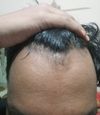community Two months of minoxidil foam + redensyl liquid progress pics
A 24 year old male with no family history of balding who has been using minoxidil foam and Redensyl liquid for two months to treat hair loss, posting pictures to document his progress.
